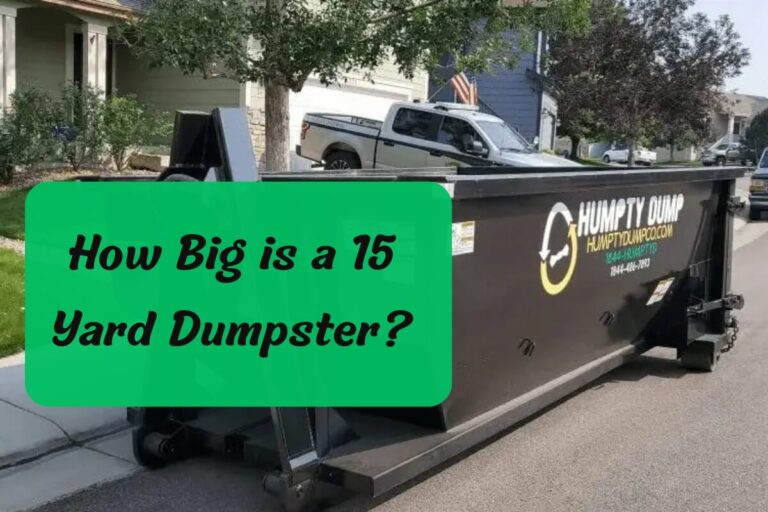Whether you’re tackling a home renovation, cleanout, or landscaping project, renting a small dumpster can be an affordable and convenient solution for disposing of debris, junk, and waste materials. These portable containers allow you to easily collect and remove unwanted items without making multiple trips to the landfill or recycling center. But how much should you expect to pay for a small dumpster rental?
How much does a small dumpster cost? The average cost to rent a small 10-yard dumpster is between $200-$400 per week, though prices can range from $75-$600 depending on factors like location, rental period, dumpster type, and waste materials.
This comprehensive guide will break down the costs of renting a small residential dumpster and explore factors that can impact pricing. We’ll also provide tips for choosing the right dumpster size, getting the best deal, and understanding what items are prohibited in dumpster rentals. Let’s dive in!
What is Considered a Small Dumpster?
Small dumpsters, designed for residential use, typically range from 2 to 10 cubic yards in size. These compact roll-off containers are perfect for home projects that generate a moderate amount of debris, such as:
- Home cleanouts (basements, garages, attics)
- Light remodeling jobs (bathroom, kitchen, etc.)
- Furniture/appliance removal
- Deck demolition
- Yard waste cleanup
The most common small dumpster sizes are:
2-Yard Dumpsters
- Dimensions: 6ft x 3ft x 3ft
- Weight capacity: 400 lbs
- Best for: Very small loads like a single furniture removal
4-Yard Dumpsters
- Dimensions: 6ft x 4.5ft x 4ft
- Weight capacity: 800 lbs
- Best for: Garage/basement cleanouts, small remodels
6-Yard Dumpsters
- Dimensions: 6ft x 5ft x 6ft
- Weight capacity: 1,200 lbs
- Best for: Larger home cleanouts, deck removal
8-Yard Dumpsters
- Dimensions: 6ft x 6ft x 7ft
- Weight capacity: 1,600 lbs
- Best for: Bigger remodeling jobs, roofing
10-Yard Dumpsters
- Dimensions: 14ft x 7.5ft x 3.5ft
- Weight capacity: 4,000-6,000 lbs
- Best for: Medium to large home renovations
Anything larger than 10 cubic yards is considered a full-size construction dumpster, more suited for major additions, demolitions, and commercial projects.
Average Small Dumpster Rental Costs
The national average cost to rent a small dumpster falls between $200-$600 per week. However, rental rates can vary significantly based on several key factors we’ll explore later. Here’s a basic pricing breakdown by common dumpster sizes:
2-Yard Dumpster Prices
A 2-yard mini dumpster is the smallest size you can rent. These are best for very small loads like furniture removal or appliance disposal. Nationally, 2-yard dumpster rental costs range from:
- $75 – $125 per week
4-Yard Dumpster Prices
For garage/basement cleanouts or small remodeling jobs, a 4-yard dumpster is a good option. The U.S. average cost is:
- $125 – $200 per week
6-8 Yard Dumpster Prices
As you move up in size, prices increase accordingly. A 6-yard dumpster averages:
- $200 – $275 per week
While an 8-yard dumpster runs about:
- $225 – $300 per week
These mid-range bins work well for larger home cleanouts, deck removals, and more extensive remodels.
10-Yard Dumpster Prices
The 10-yard is the largest “small” residential dumpster size and the most popular option for home renovation projects. Nationwide, you can expect to pay:
- $224 to $531 per week for a 10-yard roll-off rental
Of course, these are just average rate ranges. The exact pricing will depend on your location and several other factors.
Factors Affecting Small Dumpster Rental Costs
While dumpster size is the primary cost factor, several other variables can impact rental rates for small residential dumpsters. Understanding these factors is key to budgeting accurately for your project’s disposal needs.
Location
Where you live plays a big role in dumpster rental pricing due to operating costs, competition, and local regulations. In general, urban and suburban areas tend to have higher dumpster rates compared to rural towns.
For example, renting a 10-yard dumpster in New York City could cost $400-$690 per week, while the same-sized dumpster might only run $440 to $586 in a smaller Kansas town. Rental providers in your state or region can give you the most accurate local pricing information.
Rental Period
Most dumpster rental periods are 7-10 days, with weekly pricing giving you the best value. Renting for a single day incurs higher per-day costs:
- 10-yard dumpster daily rate: $25 – $80
If you need a dumpster for longer than a couple weeks, look into monthly rental pricing which can be more cost-effective:
- 10-yard monthly rate: $224 to $531
Be aware that you may face late fees if you return the dumpster past your initial rental period.
Dumpster Type
While roll-off dumpsters are the most common residential rental, some companies also offer:
- Front-load dumpsters
- Bag-style dumpsters
- Specialty dumpsters (e.g. compactors)
Front-load dumpsters are typically less expensive ($90-$300/week), though not as convenient for home projects. Bag and specialty dumpsters can cost $180-$300 per week.
Waste Type
The type of debris and materials you’ll be disposing of impacts pricing too. Household junk and trash incur the lowest rental rates, while construction/demolition debris costs more due to its weight. Yard waste like branches and sod typically falls somewhere in between.
Some examples of debris pricing for a 10-yard dumpster rental:
- Household trash: $200 – $400 per week
- Yard waste: $300 – $500 per week
- Construction debris: $400 – $600 per week
If renting for heavy materials like concrete, brick, or dirt, expect to pay even higher rates.
Weight/Overage Fees
All dumpster rentals include an allowance for a certain weight, usually 1-2 tons for smaller residential sizes. If you exceed this weight limit, you’ll face overage charges which can add up:
- 10-yard dumpster overages: $60 – $70+ per additional ton
This weighs in (no pun intended!) as one of the costlier fees, so try to avoid overloading your dumpster if possible. The rental company can recommend an appropriate size based on your projected debris weight.
Other Potential Fees
While base dumpster rental rates cover delivery, pickup, taxes, and basic dump fees, you may encounter some additional charges like:
- Permit fees (if required by your municipality)
- Late fees for keeping the dumpster past the rental period
- Environmental fees for improperly disposing of hazardous materials
- Trip fees if the driver has to return for an overloaded/inaccessible dumpster
- Damage/Cleanup fees for making a mess on your property
Always review all potential fees with the rental company before booking to avoid surprises on your final bill.
How to Choose the Right Small Dumpster Size
Accurately estimating your disposal needs upfront ensures you get a properly sized dumpster while avoiding overage costs. Here are some tips on selecting the ideal dumpster size:
Estimating Dumpster Volume Needed
While dumpster sizes are measured by cubic yards, visualizing those dimensions can be tough. Using common household objects as references provides helpful perspective, such as:
- 10-yard dumpster holds about 4 full pickup truck loads of debris
- A 10-yard dumpster can contain 50-70 trash bags
- 6-yard dumpster holds 50-60 wheelbarrow loads
In addition to volume, you’ll want to consider the weight of your debris when choosing a dumpster. Heavy materials like concrete, brick, and dirt require stricter weight limits than lighter household junk.
Project Size/Type Guidelines
Another approach is to base your dumpster size on the scope of your project:
- 2-4 yard dumpsters are best for very small jobs like single furniture/appliance disposal or clearing out a garage
- 6-8 yard dumpsters work well for home cleanouts, garage demolitions, deck removals, and minor bathroom/kitchen remodels
- For bigger home renovation projects like re-roofing, additions, or whole-home remodels, you’ll likely need a 10-yard or larger dumpster
If you’re still unsure what size is appropriate, most rental companies can make a recommendation after discussing your project details.
Money-Saving Tips for Small Dumpster Rentals
Renting a small residential dumpster doesn’t have to break the bank. Follow these simple tips to get the best deal:
Get Multiple Quotes
Dumpster rental rates can vary between local companies, so take the time to shop around and request quotes from 2-3 different providers in your area. Be sure to get complete pricing details including any fees.
Ask About Discounts
Many dumpster rental businesses offer discounts, especially for longer rental periods, active military/veterans, seniors, and more. It never hurts to inquire about any available discounts when booking.
Only Pay for What You Need
Don’t overestimate your disposal needs. Opt for the smallest appropriately sized dumpster based on your projected debris to avoid paying for excess capacity you won’t use.
Load Dumpster Properly
Take care to load your dumpster neatly and distribute debris evenly. Overloading or poorly loading can result in weight overages or trip fees if the hauler can’t safely transport the bin.
Return On-Time
Most companies charge daily rates once you exceed the initial rental period. Return the dumpster promptly when your project is done to avoid costly late fees.
Prohibited Items for Dumpster Rentals
While dumpsters provide a convenient disposal solution, they can’t accept all types of waste. Rental companies prohibit certain materials due to environmental regulations or policies at receiving landfill/transfer stations.
Common prohibited items include:
- Hazardous wastes (asbestos, pesticides, oils, solvents, etc.)
- Batteries
- Motor oil & automotive fluids
- Paint and stains
- Refrigerant appliances
- Electronics/TVs
- Railroad ties & treated woods
- Tires
- Yard waste (unless renting dedicated yard waste dumpster)
- Bricks, concrete, and dirt (in some cases)
Rental companies may allow limited amounts of some items like small concrete pieces. However, it’s best to check their specific policy and waste acceptance criteria.
Proper Disposal Options
So how can you properly dispose of prohibited dumpster items? Some potential options include:
- Contact your municipal household hazardous waste program
- Use local transfer stations/recycling centers
- Hire a junk removal company
- Check for local charities that accept donations of reusable items
- Schedule a bulk trash pickup through your regular waste service
Trying to improperly dispose of restricted items in a rented dumpster can lead to hefty fines. Always confirm what’s allowed first.
Conclusion
Renting a small 2-10 yard dumpster provides an easy, convenient solution for responsibly disposing of debris and junk from home projects or cleanouts. While rental costs can range anywhere from $75-$600 per week, understanding factors like location, dumpster size, rental period, and debris type is key to budgeting accurately.
Be sure to get multiple quotes from local rental companies and inquire about any available discounts. Choosing the right appropriately sized dumpster, loading carefully, and returning on time are other great ways to maximize savings. Don’t forget to confirm your rental provider’s policies on acceptable debris to avoid any surprise fees for prohibited materials.
With some basic preparation and cost comparisons, renting a small dumpster can provide an affordable, stress-free disposal solution for your next home improvement project.

